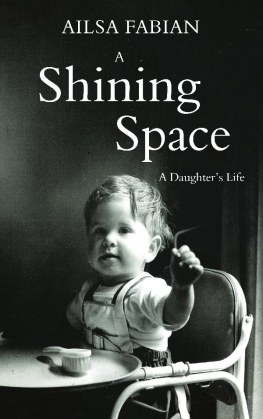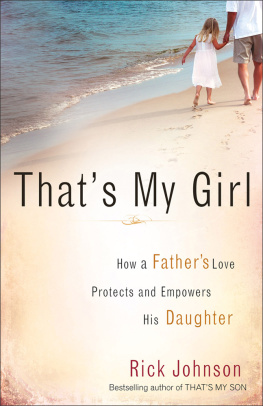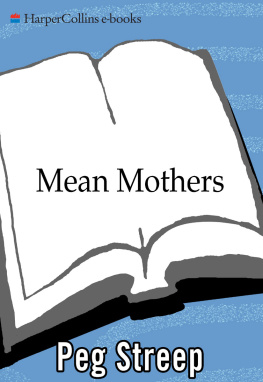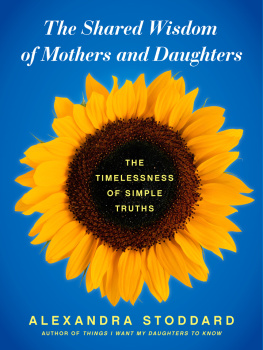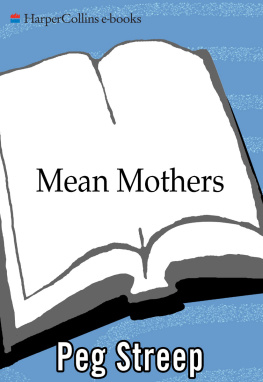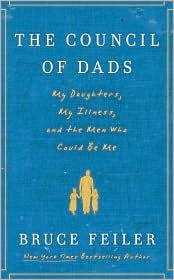AILSA FABIAN
A
Shining
Space
A Daughters Life

Contents
Ailsa Fabian was born in Melbourne, where her mother, with two sisters, had built up a thriving fashion business in the years after World War One. Ailsa assumed that, like them, work outside the home would always be central to her life. She lectured in history at Melbourne University before studying sociology at Columbia University, New York, and, after moving to London in 1952, worked in social research and in the fashion business. Then, following marriage to the sculptor Erwin Fabian and the birth of her daughter, she became so entranced by the miracle of Sarahs unfolding engagement with the world, that she chose to be an-almost-full-time mother.
When Sarah died in 1964 while on a family visit to Australia, Ailsa turned to writing. She had published various sociological studies, but The Daniel Diary , which records the reactions of her three-year-old son to his sisters death, was her first literary work. It was followed by The Sarah Journals .
Copyright 2014 Ailsa Fabian
The moral right of the author has been asserted.
Apart from any fair dealing for the purposes of research or private study, or criticism or review, as permitted under the Copyright, Designs and Patents Act 1988, this publication may only be reproduced, stored or transmitted, in any form or by any means, with the prior permission in writing of the publishers, or in the case of reprographic reproduction in accordance with the terms of licences issued by the Copyright Licensing Agency. Enquiries concerning reproduction outside those terms should be sent to the publishers.
Matador
9 Priory Business Park
Kibworth Beauchamp
Leicestershire LE8 0RX, UK
Tel: (+44) 116 279 2299
Fax: (+44) 116 279 2277
Email:
Web: www.troubador.co.uk/matador
ISBN 978-1783067-879
British Library Cataloguing in Publication Data.
A catalogue record for this book is available from the British Library.

Matador is an imprint of Troubador Publishing Ltd
For Erwin and Daniel,
and my grandchildren Hannah and Zac,
and in memory of Dr Joseph Adler
Take your delight in momentariness,
Walk between dark and dark, a shining space,
With the graves narrowness
Robert Graves
Behold what a marvellous creature lived upon this earth!
This is the cry to which all biography seeks
to move the world.
Thomas Mann
Her fate to know, in ideal form, a childs life, with
its dependency and limitations, its eager reaching
out for the future, and its fullness of love received
and given. To love, in Michael Balints wonderful
phrase, innocently, unconditionally, as only children
can love. To love with an adult strength of passion,
and at the end of five years, to die.
The Sarah Journals
Foreword
Sarah Eugenie Fabian, my daughter, died suddenly, on June 22 1964, at the of five, from a bronchial infection. I started almost at once to write about her, in the hope that something of the miracle of love and life that she had been for me and for her father, Erwin, could be saved from oblivion and shared with others. This book is based on the memories I recorded in the first years after her death, when the essence of her vibrant self, and of my love for her, and many details of our life together were still vividly present to me.
When I began, many years ago, very few personal accounts of parenthood and early childhood had been published. That is certainly no longer the case. Academic research into those earliest years has also expanded enormously. In the light of recent reading and thinking, I have asked myself new questions about Sarah, become aware of mysteries that I did not then see or understand, and acquired a more critical attitude to my own behaviour and theories. And through living close to two grandchildren, I have seen that diametrically opposed ways of behaving towards children can have equally happy consequences. I have included some later reflections but nothing has caused me to change what I first wrote about Sarah and our life with her. It remains the vision I had when she was alive.
The cabin was dark and silent as we flew over the Pacific, but I could not sleep. As dawn approached, I looked out over a vast cloud-landscape of deep chasms and craggy summits, tinged pink and apricot and saffron, changing to dazzling white as the light grew stronger. Somewhere, in this beautiful nowhere, I decided to have a baby.
I was between two worlds, on my way home to London after visiting my family in Melbourne, leaving behind me also a brief, impossible love affair, which had ended in the euphoria of mutual renunciation. It was a time for change. Sated with the emotions of grand opera, I considered myself ready to accept the banalities of domestic comedy. Insofar as I imagined it at all, having a baby seemed a very banal thing to do.
I was thirty-five, late enough if I ever wanted children. And in a mild way no doubt I did, although previously the possibility had scarcely been part of my plans, dreams, yearnings or fantasies. I knew nothing about babies, had never felt the slightest interest in them, had hardly ever even held one. When my sister and brother, and friends of my own age, had been producing children, I was on the other side of the world, studying and working. I had thought of myself, at least since my appointment to a university teaching job, as a career academic, primarily and unshakably devoted to learning, and had scoffed at the notion that I would ever abandon research, teaching and writing for marriage and parenthood. But I was also a child of prosperity, who assumed that eventually all the good things of life would come her way. These, it seemed to be generally considered, included children.
I meditated during the flight on my habit of falling in love with gifted, egotistical, dominating men, who dazzled me with visions of myself and my future, based on nothing but their own fantasies. Flattering and exhilarating but not, I now saw, a good foundation on which to build a life of my own. Erwin, with whom I had lived happily for several years, and who was to become Sarahs father, is certainly no flatterer, and that seemed a positive quality.
Back in London, Erwin was not enthusiastic about the proposal that we have a baby, but he neither refused outright nor made any serious attempt to dissuade me. We hardly discussed it. I cant recall any talk about how we would support or care for a child, or how our lives might change. I do remember one occasion when, walking home one night through deserted streets, he said, You dont really want a baby, do you? and instead of argument, mimicked a babys desolate frantic crescendo of wailing. It was at least an evocation of the future, whereas I merely laughed indulgently.
I took for granted that we would both continue to work, and it didnt enter my head that this might be difficult. My mother had always worked, but I failed to remind myself that she had employed a nurse, a cook and a housemaid. By contrast, neither of us was solidly established in our chosen profession. Erwin worked as a freelance graphic designer. I had taught history at Melbourne University for several years, and then studied sociology at Columbia University in New York, before moving to London. I had done various pieces of social research, but had recently turned down several job offers, to make time for independent study and writing. So I was unemployed. But I must have assumed, without making calculations, that we had enough money. It was family money, derived from the successful fashion business founded and run by my mother and her two sisters, Aunt Nell and Aunt Mary. I had grown up in a matriarchy, in which the women earned more than their husbands, and made all the important decisions, and I seem to have inherited an assumption that I should, and could, pay my own way.

